|
COVID-19 Emergency Response Information
Stay Safer at Home. Stay Healthy.
COVID-19 Emergency Response Information at
AUCD's National Center on Disability in Public Health
Latest Public Health and Research Information about COVID-19
 The COVID-19 cases and deaths are rising across the United States. This is an emerging, rapidly evolving situation, and the National Institute of Health (NIH) is doing everything to get toward the development of diagnostics, therapeutics, and vaccines. You can find the latest public health information from the Centers for Disease Control and Prevention (CDC) and the latest research information from NIH. The COVID-19 cases and deaths are rising across the United States. This is an emerging, rapidly evolving situation, and the National Institute of Health (NIH) is doing everything to get toward the development of diagnostics, therapeutics, and vaccines. You can find the latest public health information from the Centers for Disease Control and Prevention (CDC) and the latest research information from NIH.
Public Health is for Everyone Toolkit Updates: COVID-19 Resources!
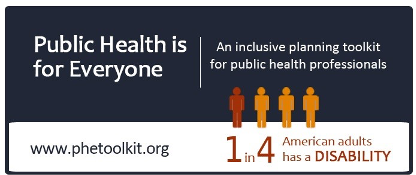 The Public Health is for Everyone Toolkit is a one-stop collection of resources on health and disability. The online toolkit serves to increase the capacity of public health professionals to create programs that benefit entire communities, including people who have disabilities. The Public Health is for Everyone Toolkit provides resources to enhance planning efforts in key issue areas such as emergency preparedness, nutrition, obesity, health care access, accessibility, and more. The Public Health is for Everyone Toolkit is a one-stop collection of resources on health and disability. The online toolkit serves to increase the capacity of public health professionals to create programs that benefit entire communities, including people who have disabilities. The Public Health is for Everyone Toolkit provides resources to enhance planning efforts in key issue areas such as emergency preparedness, nutrition, obesity, health care access, accessibility, and more.
Visit the COVID-19 issue area of the PHEtoolkit.org to see all the newly added resources for current information and strategies for support and coping with social distancing! You can also submit resources to be included in the toolkit here!
AUCD News & Events
AUCD for All 2021 Virtual Gala: Celebrating 50 Years of Leadership: Looking Back, Moving Forward
Wednesday, April 14, 2021, 7:00PM ET
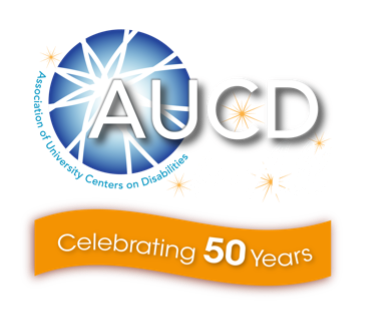 Join the virtual 2021 AUCD for ALL Gala to celebrate 50 years of leadership as well as amplify the voices of current and future leaders. See the About page for more information on AUCD's 50th, the Sponsors page for a list of current Sponsors, and the Support AUCD page to learn how you can be a sponsor or support AUCD in other ways. The AUCD virtual Gala is free to all! Visit the gala website for more information as honorees and other planning details are confirmed. Join the virtual 2021 AUCD for ALL Gala to celebrate 50 years of leadership as well as amplify the voices of current and future leaders. See the About page for more information on AUCD's 50th, the Sponsors page for a list of current Sponsors, and the Support AUCD page to learn how you can be a sponsor or support AUCD in other ways. The AUCD virtual Gala is free to all! Visit the gala website for more information as honorees and other planning details are confirmed.
Do you have an interesting image, video, or story that relates to AUCD's history? AUCD will feature submissions throughout the year to celebrate their 50th Anniversary. Share your story!
Call for Requests for Assistance: Participate in the Morehouse School of Medicine National COVID-19 Resiliency Network's Regional Community Coalitions
Submissions due Friday, April 30, 2021, at 5:00 PM ET

The National COVID-19 Resiliency Network (NCRN) is designed to develop and coordinate a strategic and structured national network of national, state/territorial/tribal, and local public and community-based organizations that will mitigate the impact of COVID-19 on communities. The Regional Community Coalition (RCC) members include State & Territory Minority Health and Indian Health Service (IHS) Offices, other national and regional organizations, and Community Health Workers representing disproportionately impacted communities throughout the United States.
NCRN focuses on the most vulnerable communities that have been disproportionately impacted by COVID-19. Regional Community Coalition participants will be responsible for informing and engaging with regional groups, aligning activities, building capacity, and engaging the community in coordination with NCRN's local and national partners on COVID-19 testing, vaccinations, and primary care services to vulnerable populations.
Learn more about RCC participation and if you have additional questions, please contact Dawn Rudolph ([email protected]).
The COVID-19 Pandemic and People with Disabilities:
Primary Concerns, the AUCD Network response, and Needs for the Future
 While the COVID-19 pandemic has impacted how individuals worldwide live, work, communicate, and receive medical care and education, it has further illustrated the disproportionate gaps that exist for people with disabilities to receive these same resources and services necessary for survival and quality of life. Since March 2020, AUCD has tracked advocacy, education, and information dissemination efforts pertaining to the needs of people with disabilities during the COVID-19 pandemic among its policy, public health, technical assistance, and communications teams. While the COVID-19 pandemic has impacted how individuals worldwide live, work, communicate, and receive medical care and education, it has further illustrated the disproportionate gaps that exist for people with disabilities to receive these same resources and services necessary for survival and quality of life. Since March 2020, AUCD has tracked advocacy, education, and information dissemination efforts pertaining to the needs of people with disabilities during the COVID-19 pandemic among its policy, public health, technical assistance, and communications teams.
Read the report to learn more about AUCD's main focus during the COVID-19 pandemic, as identified by the needs expressed by the disability community and AUCD network members.
AUCD Welcomes 4 New Learn the Signs. Act Early Ambassadors
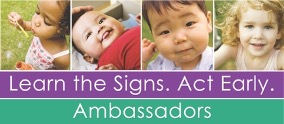 AUCD and CDC are proud to announce that four spots have been filled in Delaware, Louisiana, New Hampshire, and Rhode Island for the new Learn the Signs. Act Early Ambassadors. Please join us in welcoming Sarah Mallory (Delaware), Laura Thornton (Louisiana), Jennifer Pineo (New Hampshire), and Jennifer Sanchez (Rhode Island). AUCD and CDC are proud to announce that four spots have been filled in Delaware, Louisiana, New Hampshire, and Rhode Island for the new Learn the Signs. Act Early Ambassadors. Please join us in welcoming Sarah Mallory (Delaware), Laura Thornton (Louisiana), Jennifer Pineo (New Hampshire), and Jennifer Sanchez (Rhode Island).
Sarah Mallory is an Assistant Professor of Special Education at the University of Delaware with a joint appointment at the School of Education and Center for Disabilities Studies (CDS). Laura Thornton is a Developmental Screening Coordinator at the Louisiana Department of Health. Jennifer Pineo is a Project Coordinator at New Hampshire Family Voices. Jennifer Sanchez is an Early Intervention Technical Assistance Specialist at the Paul V. Sherlock Center on Disabilities at Rhode Island College.
Locate the Act Early Ambassador in your state!
AUCD Joins National COVID-19 Network to Build Resilience Against Pandemic Among the Disability Community
 AUCD joined Morehouse School of Medicine (MSM)'s National COVID-19 Resiliency Network (NCRN) of partners to inform community-driven response, recovery, and resiliency strategies for addressing the impact of COVID-19 on communities. In response to the needs of the disability community, AUCD has established a communications strategy to support the development of linguistically and culturally competent messaging and materials by representing plain language as an accessible format and bringing awareness of COVID-19 vaccine information. Learn more about NCRN and how nearly 40 national partner organizations will band together to bring communities culturally appropriate information and health services. AUCD joined Morehouse School of Medicine (MSM)'s National COVID-19 Resiliency Network (NCRN) of partners to inform community-driven response, recovery, and resiliency strategies for addressing the impact of COVID-19 on communities. In response to the needs of the disability community, AUCD has established a communications strategy to support the development of linguistically and culturally competent messaging and materials by representing plain language as an accessible format and bringing awareness of COVID-19 vaccine information. Learn more about NCRN and how nearly 40 national partner organizations will band together to bring communities culturally appropriate information and health services.
Access to Healthcare
Autism Acceptance Month 2021 Activities
 The Association of Maternal & Child Health Programs' (AMCHP) State Public Health Autism Resource Center (SPHARC) is excited to announce their Autism Acceptance Month activities! From 2:00-3:00 PM EST on Thursday, April 1, 2021, SPHARC will host a Twitter chat to kick off Autism Acceptance Month. Checkout the Twitter chat questions and guidelines on how to participate and join in on the discussion! The Association of Maternal & Child Health Programs' (AMCHP) State Public Health Autism Resource Center (SPHARC) is excited to announce their Autism Acceptance Month activities! From 2:00-3:00 PM EST on Thursday, April 1, 2021, SPHARC will host a Twitter chat to kick off Autism Acceptance Month. Checkout the Twitter chat questions and guidelines on how to participate and join in on the discussion!
SPHARC will also host a series of four coffee talks every Wednesday in April from 2:00-2:45 PM EST that cover a variety of topics across the lifespan. Each coffee talk will feature brief presentations followed by a question-and-answer session with participants. Make sure you register to attend! Topics are in the process of being finalized and are subject to change. Information for joining the coffee talks will be sent upon registration.
Addressing Disparities through an Innovative Leadership Development Model
 Representation is a core value of diversity and inclusion that lessens the barriers communities face while engaging with public health institutions. Minority communities, including new immigrants, will be disenfranchised if the systems that serve them are not responsive to their needs. In various public health settings, adequate public health service is not provided due to barriers such as language and culture. Additionally, programs lack proactive measures to engage and earn the trust of diverse community members. The Ohio State University (OSU) Nisonger Center and the Leadership Education in Neurodevelopmental Disabilities (LEND) program created an innovative leadership development model to address this issue. Started in 2017, the program provides Somali community health workers the tools they need to navigate the complex systems in Ohio. They participate in seminars, clinical and leadership development projects, and visit Capitol Hill to meet with their Congressional Delegations to increase their knowledge of systems. Equipped with these tools, they continue to work in their community to increase service utilization and community participation in policy and program development activities at various levels. Learn more about the program and how it is engaging various communities. Representation is a core value of diversity and inclusion that lessens the barriers communities face while engaging with public health institutions. Minority communities, including new immigrants, will be disenfranchised if the systems that serve them are not responsive to their needs. In various public health settings, adequate public health service is not provided due to barriers such as language and culture. Additionally, programs lack proactive measures to engage and earn the trust of diverse community members. The Ohio State University (OSU) Nisonger Center and the Leadership Education in Neurodevelopmental Disabilities (LEND) program created an innovative leadership development model to address this issue. Started in 2017, the program provides Somali community health workers the tools they need to navigate the complex systems in Ohio. They participate in seminars, clinical and leadership development projects, and visit Capitol Hill to meet with their Congressional Delegations to increase their knowledge of systems. Equipped with these tools, they continue to work in their community to increase service utilization and community participation in policy and program development activities at various levels. Learn more about the program and how it is engaging various communities.
Improving Recruitment and Retention in Learning Disability Services
 Nurses are increasingly becoming involved in the support of people with learning disabilities in social care settings. Recent policies have identified the need for an increased social care workforce, but many organizations have difficulty recruiting and retaining staff. Evidence has found that many factors influence recruitment and retention directly and indirectly, including gender and age; factors that contribute to staff stress and burnout; and organizational factors, such as supervision, training, and culture. Continue reading this article for suggestions on several areas that should be evaluated to inform an evidence-based approach to increasing the workforce that provides care for people who have an intellectual disability. Nurses are increasingly becoming involved in the support of people with learning disabilities in social care settings. Recent policies have identified the need for an increased social care workforce, but many organizations have difficulty recruiting and retaining staff. Evidence has found that many factors influence recruitment and retention directly and indirectly, including gender and age; factors that contribute to staff stress and burnout; and organizational factors, such as supervision, training, and culture. Continue reading this article for suggestions on several areas that should be evaluated to inform an evidence-based approach to increasing the workforce that provides care for people who have an intellectual disability.
Developmental Monitoring
Specialty Diagnostic Resource Center: Diagnosing Fetal Alcohol Spectrum Disorders in Arkansas
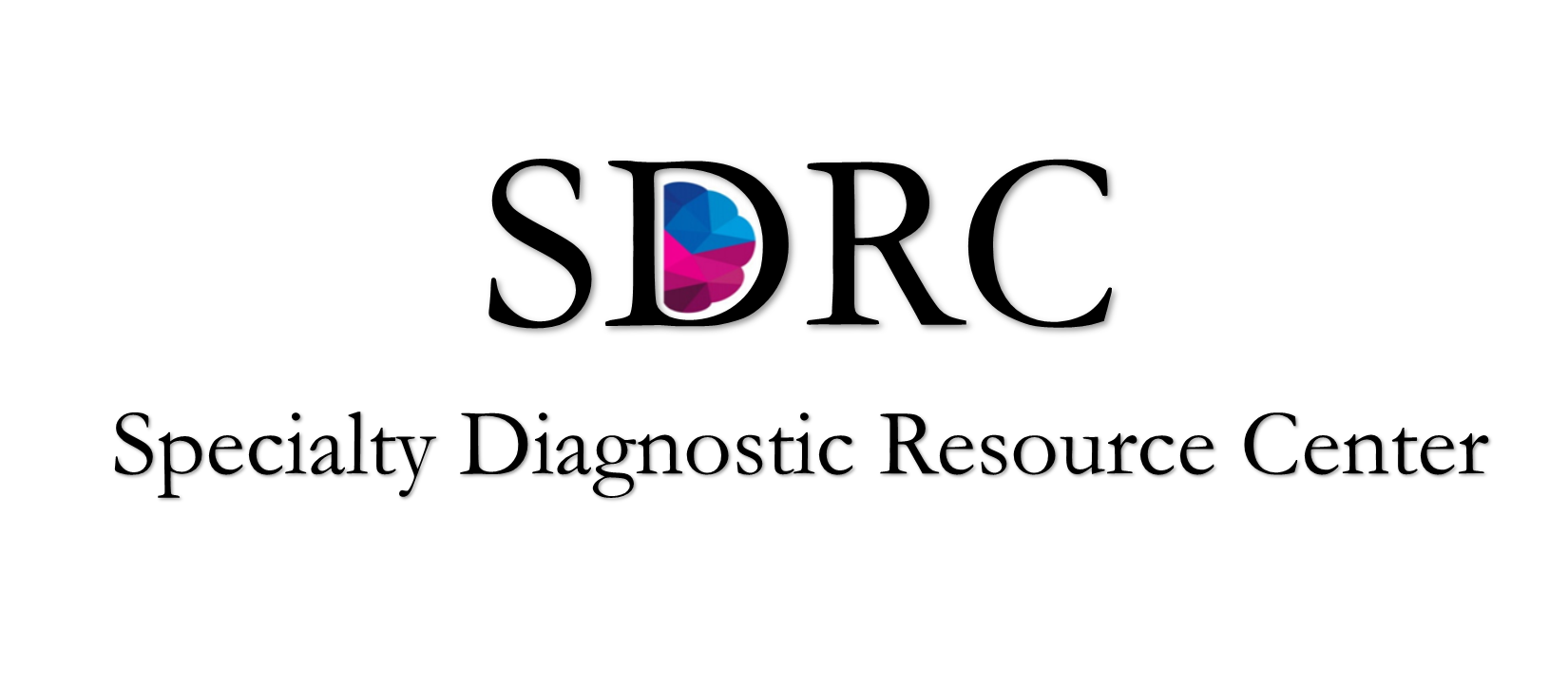 The Specialty Diagnostic Resource Center (SDRC) is Arkansas's fetal alcohol spectrum disorders (FASD) center for diagnosis, intervention, and resources. FASD affects approximately 1% to 5% of first-graders across the country, and yet less than 1% of the individuals who meet the criteria receive a diagnosis (May et al., 2018). Diagnosis can increase access to care, appropriate support that individuals with FASD might need, and advocacy efforts for inclusion and acceptance. Arkansas has an overall need for healthcare providers, but that is especially true for FASD diagnostics and interventions. SDRC is at the forefront of training Arkansans, as well as professionals from surrounding states, on diagnosis, intervention, and resources for FASD. Learn more about FASD and find helpful resources from SDRC. The Specialty Diagnostic Resource Center (SDRC) is Arkansas's fetal alcohol spectrum disorders (FASD) center for diagnosis, intervention, and resources. FASD affects approximately 1% to 5% of first-graders across the country, and yet less than 1% of the individuals who meet the criteria receive a diagnosis (May et al., 2018). Diagnosis can increase access to care, appropriate support that individuals with FASD might need, and advocacy efforts for inclusion and acceptance. Arkansas has an overall need for healthcare providers, but that is especially true for FASD diagnostics and interventions. SDRC is at the forefront of training Arkansans, as well as professionals from surrounding states, on diagnosis, intervention, and resources for FASD. Learn more about FASD and find helpful resources from SDRC.
March Is Developmental Disabilities Awareness Month
 Each March, the National Association of Councils on Developmental Disabilities (NACDD), and partners work together to create a social media campaign that highlights the many ways in which people with and without disabilities come together to form strong, diverse communities. Each March, the National Association of Councils on Developmental Disabilities (NACDD), and partners work together to create a social media campaign that highlights the many ways in which people with and without disabilities come together to form strong, diverse communities.
The campaign seeks to raise awareness about the inclusion of people with developmental disabilities in all facets of community life, as well as awareness of the barriers that people with disabilities still sometimes face in connecting to the communities in which they live. NACDD selected Eileen Schofield to draw the artwork for this year's campaign. Learn more about Developmental Disabilities Awareness Month and NACDD's selected artist Eileen Schofield.
Emergency Preparedness
The Case for Inclusion 2021 Special Report
 This year's Case for Inclusion departs from what long-time readers are used to. Whereas previous reports looked back at how well state programs supported people with intellectual and developmental disabilities (IDD), this year's report instead takes a look ahead at what's next. It starts with an examination of where we've been over the past year and how it has changed our understanding of the cracks that long existed in our system. It then lays out our blueprint for how lawmakers at all levels of government can seize on this critical moment to both transition to a post-pandemic world and build from the lessons of COVID-19 to invest in structural changes that usher in the long-term sustainability for community-based disability supports. This year's Case for Inclusion departs from what long-time readers are used to. Whereas previous reports looked back at how well state programs supported people with intellectual and developmental disabilities (IDD), this year's report instead takes a look ahead at what's next. It starts with an examination of where we've been over the past year and how it has changed our understanding of the cracks that long existed in our system. It then lays out our blueprint for how lawmakers at all levels of government can seize on this critical moment to both transition to a post-pandemic world and build from the lessons of COVID-19 to invest in structural changes that usher in the long-term sustainability for community-based disability supports.
Continue Reading this special report to learn more about the experiences, lessons, and opportunities needed to bring an ambitious vision for IDD inclusion in community services to fruition.
Dignity of Risk and Person-Centered Planning During COVID-19
 Nicole LeBlanc, the Person-Centered Advisory and Leadership Group coordinator at the National Center on Advancing Person-Centered Practices and Systems (NCAPPS), recently spoke about the dignity of risk and person-centered practices during an emerging pandemic. Nicole LeBlanc, the Person-Centered Advisory and Leadership Group coordinator at the National Center on Advancing Person-Centered Practices and Systems (NCAPPS), recently spoke about the dignity of risk and person-centered practices during an emerging pandemic.
In the article LeBlanc shares, "All of us face choices that carry risk. However, people with disabilities may have their choices judged differently than people without disabilities."
Check out this resource, as well as other information and tools to help ensure people are at the center of planning and delivery of supports.
The National Association of County and City Health Officials (NACCHO) Awards Funding to Address the Needs of People with Disabilities in COVID-19 Local Preparedness Planning, Mitigation, and Recovery Efforts
 The Association of State and Territorial Health Officials (ASTHO), the National Association for County and City Health Officials (NACCHO), and the Centers for Disease Control and Prevention (CDC) are committed to addressing the needs of people with disabilities throughout the COVID-19 pandemic. Through a cooperative agreement with CDC, ASTHO will place 14 "Disability and Preparedness Specialists" into the health agencies of 14 states and territories. NACCHO is working with 10 local health departments to embed Specialists at the local level. These specialists will work to improve the inclusivity of people living with disabilities in emergency preparedness planning and response efforts. Currently, specialists are working to assess health agency capacity to address the needs of people living with disabilities in emergencies and are exploring partnerships with disability organizations. The Association of State and Territorial Health Officials (ASTHO), the National Association for County and City Health Officials (NACCHO), and the Centers for Disease Control and Prevention (CDC) are committed to addressing the needs of people with disabilities throughout the COVID-19 pandemic. Through a cooperative agreement with CDC, ASTHO will place 14 "Disability and Preparedness Specialists" into the health agencies of 14 states and territories. NACCHO is working with 10 local health departments to embed Specialists at the local level. These specialists will work to improve the inclusivity of people living with disabilities in emergency preparedness planning and response efforts. Currently, specialists are working to assess health agency capacity to address the needs of people living with disabilities in emergencies and are exploring partnerships with disability organizations.
To connect with the disability and preparedness specialists to learn more about their work and opportunities for partnership, please email [email protected].
#Sleeveup to Fight COVID-19
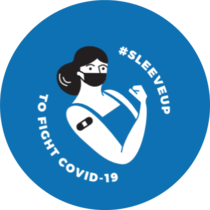 The #Sleeveup Campaign is partnering with a number of organizations to provide essential updates on COVID-19 innovations and vaccinations. Checkout these three resources on vaccine distribution, rural COVID-19 innovations, and maternal health resources. The #Sleeveup Campaign is partnering with a number of organizations to provide essential updates on COVID-19 innovations and vaccinations. Checkout these three resources on vaccine distribution, rural COVID-19 innovations, and maternal health resources.
Nutrition and Healthy Weight
How Can We Help Change the Narrative and be Champions for Athletes with Disabilities in our Communities? Together.
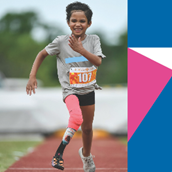 Move United Education Conference is ready to provide the tools and resources to help demystify disability and make inclusion a reality. This year's theme, "Join the Movement: Redefining the Reality of Adaptive vs. Inclusive Sport," brings us together to lead this evolving narrative so that we leave no one on the sidelines. Move United will provide a virtual conference from May 10 -14, 2021, and host five tracks of educational sessions, including Adaptive Sport Fundamentals, Inclusive Sport Fundamentals, Diversity, Equity & Inclusion, Inclusion in Education, and Sport-Specific Education. Learn more about the Move United Education Conference and register today! Move United Education Conference is ready to provide the tools and resources to help demystify disability and make inclusion a reality. This year's theme, "Join the Movement: Redefining the Reality of Adaptive vs. Inclusive Sport," brings us together to lead this evolving narrative so that we leave no one on the sidelines. Move United will provide a virtual conference from May 10 -14, 2021, and host five tracks of educational sessions, including Adaptive Sport Fundamentals, Inclusive Sport Fundamentals, Diversity, Equity & Inclusion, Inclusion in Education, and Sport-Specific Education. Learn more about the Move United Education Conference and register today!
The 3rd Annual Disability Awareness Symposium Fitness for All: Inclusive Fitness and Sport
March 29- April 2, 2021
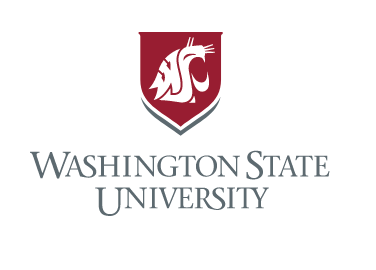 The theme of Washington State's Annual Disability Awareness Symposium is Fitness for All: Inclusive Fitness and Sport. The symposium will hold a series of workshops and presentations focused on mindfulness, mental health, physical health, and nutrition. We will also be offering a series of adaptive workout classes via Zoom or at the Chinook center. These adaptive fitness classes will include yoga, Zumba, weightlifting, and rock climbing. The theme of Washington State's Annual Disability Awareness Symposium is Fitness for All: Inclusive Fitness and Sport. The symposium will hold a series of workshops and presentations focused on mindfulness, mental health, physical health, and nutrition. We will also be offering a series of adaptive workout classes via Zoom or at the Chinook center. These adaptive fitness classes will include yoga, Zumba, weightlifting, and rock climbing.
The symposium will also feature Wesley Hamilton as the keynote speaker. Wesley is the Executive Director of the organization, Disabled But Not Really (DBNR). DBNR advocates for the disabled community by raising awareness about Spinal Cord Injury (SCI), promoting mental and physical wellness, and engaging diverse audiences through local and national events. Learn more about the event and register today!
Sexual and Reproductive Health
Archived Webinar: Sex Talk for Self-Advocates Webinar #8: Parenting
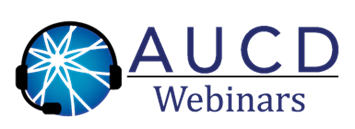 AUCD's Sexual Health special interest group and a group of expert hosts including sexuality educators and self-advocates invited a panel to discuss questions and topics related to having children and parenting for individuals with intellectual and developmental disabilities. This webinar is part of an on-going series that addresses self-advocate questions about relationships and sexuality. This series is a great learning opportunity for self-advocates, professionals, and paraprofessionals working with individuals with intellectual and developmental disabilities to better understand sexual health needs. Watch the archived webinar now and all of the webinars in the Sex Talk for Self-Advocates Series. AUCD's Sexual Health special interest group and a group of expert hosts including sexuality educators and self-advocates invited a panel to discuss questions and topics related to having children and parenting for individuals with intellectual and developmental disabilities. This webinar is part of an on-going series that addresses self-advocate questions about relationships and sexuality. This series is a great learning opportunity for self-advocates, professionals, and paraprofessionals working with individuals with intellectual and developmental disabilities to better understand sexual health needs. Watch the archived webinar now and all of the webinars in the Sex Talk for Self-Advocates Series.
A Key Insight into How to Overcome Resistance and Get Buy-In
 "People with I/DD are very interested in receiving sexuality education; the resistance to this education isn't coming from them, it's mostly coming from staff/professionals and parents." ~ Anonymous Self Advocate "People with I/DD are very interested in receiving sexuality education; the resistance to this education isn't coming from them, it's mostly coming from staff/professionals and parents." ~ Anonymous Self Advocate
Professional trainers from Elevatus Training are working to understand peoples' Levels of Resistance and where the resistance comes from. Continue reading the article and learn more about sexuality and developmental disability from Elevatus Training.
Wellness and Mental Health
COVID-19 and Infant and Early Childhood Mental Health Consultation (IECMHC): How to Provide Services When Everything is Different
 The Center of Excellence for Infant and Early Childhood Mental Health Consultation (IECMHC) programs are not operating "normally" right now. Everyone needs to pivot to meet the needs of communities and partners. IECMHC wants mental health consultants and consultation programs to be utilized and recognized as the incredible resources they are. IECMHC will offer support to the field (whether you are a mental health consultant, a researcher, a program director, or a recipient of consultation) in three ways: interviews with IECMHC leaders, requests for technical assistance, affinity conversations. Learn more about IECMHC and how they are providing services while dealing with COVID-19. The Center of Excellence for Infant and Early Childhood Mental Health Consultation (IECMHC) programs are not operating "normally" right now. Everyone needs to pivot to meet the needs of communities and partners. IECMHC wants mental health consultants and consultation programs to be utilized and recognized as the incredible resources they are. IECMHC will offer support to the field (whether you are a mental health consultant, a researcher, a program director, or a recipient of consultation) in three ways: interviews with IECMHC leaders, requests for technical assistance, affinity conversations. Learn more about IECMHC and how they are providing services while dealing with COVID-19.
The Center of Excellence also offers virtual events as a way to connect and provide participants an opportunity to discuss concerns, share their approaches, and learn more about how the field of mental health consultation has pivoted in these times to support young children, their families, and caregivers and their early childhood systems.
Other Resources
New Office of Minority Health Cultural Health Training in Maternal Health Care
 The Office of Minority Health's (OMH) Think Cultural Health has developed a new continuing education (CE) module, Culturally and Linguistically Appropriate Services (CLAS) in Maternal Health Care. This free, two-hour e-learning program is designed for providers and students seeking knowledge and skills related to cultural competency, cultural humility, person-centered care, and combating implicit bias across the continuum of maternal health care. This program is accredited for physicians, physician assistants, nurse practitioners, nurses, and certified midwives and nurse-midwives. The Office of Minority Health's (OMH) Think Cultural Health has developed a new continuing education (CE) module, Culturally and Linguistically Appropriate Services (CLAS) in Maternal Health Care. This free, two-hour e-learning program is designed for providers and students seeking knowledge and skills related to cultural competency, cultural humility, person-centered care, and combating implicit bias across the continuum of maternal health care. This program is accredited for physicians, physician assistants, nurse practitioners, nurses, and certified midwives and nurse-midwives.
Continue Reading about the Think Cultural Health Training and learn how to improve your quality of care by understanding, respecting, and responding to a patient's experiences, values, and beliefs.
Increasing Access to Preventative Healthcare with Inclusive Voices
 The Montana Cancer Coalition (MTCC) is increasing the use of public health data collected with people with disabilities in its planning and program implementation activities. MTCC is partnered with Montana Centers for Independent Living and developmental disability organizations on Montana Disability and Health (MTDH) Accessibility Ambassador projects to improve the accessibility of cancer screening sites statewide and increase awareness of the Accessibility Standards for Diagnostic Medical Equipment and related policy practice. The Montana Cancer Coalition (MTCC) is increasing the use of public health data collected with people with disabilities in its planning and program implementation activities. MTCC is partnered with Montana Centers for Independent Living and developmental disability organizations on Montana Disability and Health (MTDH) Accessibility Ambassador projects to improve the accessibility of cancer screening sites statewide and increase awareness of the Accessibility Standards for Diagnostic Medical Equipment and related policy practice.
Learn more about MTCC and its strategic planning process to ensure a better quality of life and enhance the odds of survivorship.
The Office of Minority Health Announces Theme for National Minority Health Month 2021 - #VaccineReady
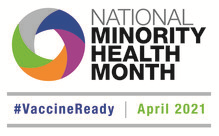 April is National Minority Health Month, and this year, the Health and Human Services (HHS) Office of Minority Health (OMH) is focusing on the disproportionate impact the COVID-19 pandemic is having on racial and ethnic minority and American Indian and Alaska Native communities and underscore the need for these vulnerable communities to get vaccinated as more vaccines become available. April is National Minority Health Month, and this year, the Health and Human Services (HHS) Office of Minority Health (OMH) is focusing on the disproportionate impact the COVID-19 pandemic is having on racial and ethnic minority and American Indian and Alaska Native communities and underscore the need for these vulnerable communities to get vaccinated as more vaccines become available.
This year's theme for National Minority Health Month is #VaccineReady. The focus will be to empower communities to get the facts about COVID-19 vaccines, share accurate vaccine information, participate in clinical trials, get vaccinated when the time comes, and practice COVID-19 safety measures.
African American Health: Black History Month and Beyond
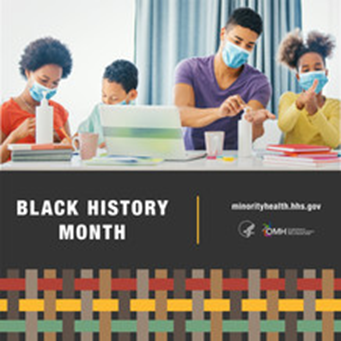 Throughout February, the Health and Human Services (HHS) Office of Minority Health (OMH) celebrated the achievements of African Americans and honored the significant role and impact they made on all facets of life and society throughout U.S. history and the conversation will continue. Throughout February, the Health and Human Services (HHS) Office of Minority Health (OMH) celebrated the achievements of African Americans and honored the significant role and impact they made on all facets of life and society throughout U.S. history and the conversation will continue.
Visit the OMH website's Profile on Black/African Americans for data on heart disease, stroke, obesity, immunizations, HIV/AIDS and other diseases among the African American community. And don't forget to visit OMH's Black History Month webpage for information and resources you can use and share beyond February.
Delivering A World-Class Platform to Support the Sickle Cell Community
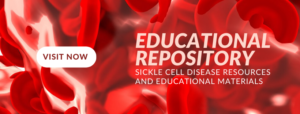 The Sickle Cell Disease Association of America Inc.'s Sickle Cell Disease Educational Information Repository (SCD Repository) was designed to provide an up-to-date directory of disease education, information, and resources. The Sickle Cell Disease Association of America Inc.'s Sickle Cell Disease Educational Information Repository (SCD Repository) was designed to provide an up-to-date directory of disease education, information, and resources.
The SCD Repository was developed as a product of the Health Resources and Services Administration (HRSA)-funded Sickle Cell Disease Newborn Screening Follow-up Program (SCDNBSFP), which is comprised of sixteen (16) community-based organization partnerships. The SCDNBSFP provides recruitment, care coordination, education, and outreach to individuals living with sickle cell disease and their families.
The SCD Repository will help you understand SCD risk factors, signs, symptoms, treatment options, and more. Explore the site now to get the information you need and learn more about the mission and work of SCDAA.
|




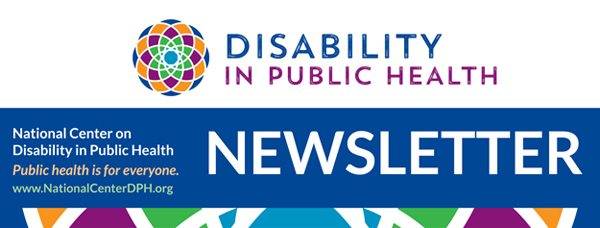
 The COVID-19 cases and deaths are rising across the United States. This is an emerging, rapidly evolving situation, and
The COVID-19 cases and deaths are rising across the United States. This is an emerging, rapidly evolving situation, and  The
The  Join the virtual 2021 AUCD for ALL Gala to celebrate 50 years of leadership as well as amplify the voices of current and future leaders. See the About page for more information on AUCD's 50th, the Sponsors page for a list of current Sponsors, and the Support AUCD page to learn how you can be a sponsor or support AUCD in other ways. The AUCD virtual Gala is free to all! Visit the
Join the virtual 2021 AUCD for ALL Gala to celebrate 50 years of leadership as well as amplify the voices of current and future leaders. See the About page for more information on AUCD's 50th, the Sponsors page for a list of current Sponsors, and the Support AUCD page to learn how you can be a sponsor or support AUCD in other ways. The AUCD virtual Gala is free to all! Visit the 
 While the COVID-19 pandemic has impacted how individuals worldwide live, work, communicate, and receive medical care and education, it has further illustrated the disproportionate gaps that exist for people with disabilities to receive these same resources and services necessary for survival and quality of life. Since March 2020, AUCD has tracked advocacy, education, and information dissemination efforts pertaining to the needs of people with disabilities during the COVID-19 pandemic among its policy, public health, technical assistance, and communications teams.
While the COVID-19 pandemic has impacted how individuals worldwide live, work, communicate, and receive medical care and education, it has further illustrated the disproportionate gaps that exist for people with disabilities to receive these same resources and services necessary for survival and quality of life. Since March 2020, AUCD has tracked advocacy, education, and information dissemination efforts pertaining to the needs of people with disabilities during the COVID-19 pandemic among its policy, public health, technical assistance, and communications teams. AUCD and CDC are proud to announce that four spots have been filled in Delaware, Louisiana, New Hampshire, and Rhode Island for the new Learn the Signs. Act Early Ambassadors. Please join us in welcoming Sarah Mallory (Delaware), Laura Thornton (Louisiana), Jennifer Pineo (New Hampshire), and Jennifer Sanchez (Rhode Island).
AUCD and CDC are proud to announce that four spots have been filled in Delaware, Louisiana, New Hampshire, and Rhode Island for the new Learn the Signs. Act Early Ambassadors. Please join us in welcoming Sarah Mallory (Delaware), Laura Thornton (Louisiana), Jennifer Pineo (New Hampshire), and Jennifer Sanchez (Rhode Island).  The Association of Maternal & Child Health Programs' (AMCHP)
The Association of Maternal & Child Health Programs' (AMCHP)  Representation is a core value of diversity and inclusion that lessens the barriers communities face while engaging with public health institutions. Minority communities, including new immigrants, will be disenfranchised if the systems that serve them are not responsive to their needs. In various public health settings, adequate public health service is not provided due to barriers such as language and culture. Additionally, programs lack proactive measures to engage and earn the trust of diverse community members. The Ohio State University (OSU) Nisonger Center and the Leadership Education in Neurodevelopmental Disabilities (LEND) program created an innovative leadership development model to address this issue. Started in 2017, the program provides Somali community health workers the tools they need to navigate the complex systems in Ohio. They participate in seminars, clinical and leadership development projects, and visit Capitol Hill to meet with their Congressional Delegations to increase their knowledge of systems. Equipped with these tools, they continue to work in their community to increase service utilization and community participation in policy and program development activities at various levels.
Representation is a core value of diversity and inclusion that lessens the barriers communities face while engaging with public health institutions. Minority communities, including new immigrants, will be disenfranchised if the systems that serve them are not responsive to their needs. In various public health settings, adequate public health service is not provided due to barriers such as language and culture. Additionally, programs lack proactive measures to engage and earn the trust of diverse community members. The Ohio State University (OSU) Nisonger Center and the Leadership Education in Neurodevelopmental Disabilities (LEND) program created an innovative leadership development model to address this issue. Started in 2017, the program provides Somali community health workers the tools they need to navigate the complex systems in Ohio. They participate in seminars, clinical and leadership development projects, and visit Capitol Hill to meet with their Congressional Delegations to increase their knowledge of systems. Equipped with these tools, they continue to work in their community to increase service utilization and community participation in policy and program development activities at various levels.  Nurses are increasingly becoming involved in the support of people with learning disabilities in social care settings. Recent policies have identified the need for an increased social care workforce, but many organizations have difficulty recruiting and retaining staff. Evidence has found that many factors influence recruitment and retention directly and indirectly, including gender and age; factors that contribute to staff stress and burnout; and organizational factors, such as supervision, training, and culture.
Nurses are increasingly becoming involved in the support of people with learning disabilities in social care settings. Recent policies have identified the need for an increased social care workforce, but many organizations have difficulty recruiting and retaining staff. Evidence has found that many factors influence recruitment and retention directly and indirectly, including gender and age; factors that contribute to staff stress and burnout; and organizational factors, such as supervision, training, and culture.  The Specialty Diagnostic Resource Center (SDRC) is Arkansas's fetal alcohol spectrum disorders (FASD) center for diagnosis, intervention, and resources. FASD affects approximately 1% to 5% of first-graders across the country, and yet less than 1% of the individuals who meet the criteria receive a diagnosis (May et al., 2018). Diagnosis can increase access to care, appropriate support that individuals with FASD might need, and advocacy efforts for inclusion and acceptance. Arkansas has an overall need for healthcare providers, but that is especially true for FASD diagnostics and interventions. SDRC is at the forefront of training Arkansans, as well as professionals from surrounding states, on diagnosis, intervention, and resources for FASD.
The Specialty Diagnostic Resource Center (SDRC) is Arkansas's fetal alcohol spectrum disorders (FASD) center for diagnosis, intervention, and resources. FASD affects approximately 1% to 5% of first-graders across the country, and yet less than 1% of the individuals who meet the criteria receive a diagnosis (May et al., 2018). Diagnosis can increase access to care, appropriate support that individuals with FASD might need, and advocacy efforts for inclusion and acceptance. Arkansas has an overall need for healthcare providers, but that is especially true for FASD diagnostics and interventions. SDRC is at the forefront of training Arkansans, as well as professionals from surrounding states, on diagnosis, intervention, and resources for FASD.  Each March,
Each March,  This year's Case for Inclusion departs from what long-time readers are used to. Whereas previous reports looked back at how well state programs supported people with intellectual and developmental disabilities (IDD), this year's report instead takes a look ahead at what's next. It starts with an examination of where we've been over the past year and how it has changed our understanding of the cracks that long existed in our system. It then lays out our blueprint for how lawmakers at all levels of government can seize on this critical moment to both transition to a post-pandemic world and build from the lessons of COVID-19 to invest in structural changes that usher in the long-term sustainability for community-based disability supports.
This year's Case for Inclusion departs from what long-time readers are used to. Whereas previous reports looked back at how well state programs supported people with intellectual and developmental disabilities (IDD), this year's report instead takes a look ahead at what's next. It starts with an examination of where we've been over the past year and how it has changed our understanding of the cracks that long existed in our system. It then lays out our blueprint for how lawmakers at all levels of government can seize on this critical moment to both transition to a post-pandemic world and build from the lessons of COVID-19 to invest in structural changes that usher in the long-term sustainability for community-based disability supports. Nicole LeBlanc, the Person-Centered Advisory and Leadership Group coordinator at the National Center on Advancing Person-Centered Practices and Systems (NCAPPS), recently spoke about the dignity of risk and person-centered practices during an emerging pandemic.
Nicole LeBlanc, the Person-Centered Advisory and Leadership Group coordinator at the National Center on Advancing Person-Centered Practices and Systems (NCAPPS), recently spoke about the dignity of risk and person-centered practices during an emerging pandemic. The Association of State and Territorial Health Officials
The Association of State and Territorial Health Officials The #Sleeveup Campaign is partnering with a number of organizations to provide essential updates on COVID-19 innovations and vaccinations. Checkout these three resources on vaccine distribution, rural COVID-19 innovations, and maternal health resources.
The #Sleeveup Campaign is partnering with a number of organizations to provide essential updates on COVID-19 innovations and vaccinations. Checkout these three resources on vaccine distribution, rural COVID-19 innovations, and maternal health resources. Move United Education Conference is ready to provide the tools and resources to help demystify disability and make inclusion a reality. This year's theme, "Join the Movement: Redefining the Reality of Adaptive vs. Inclusive Sport," brings us together to lead this evolving narrative so that we leave no one on the sidelines. Move United will provide a virtual conference from May 10 -14, 2021, and host five tracks of educational sessions, including Adaptive Sport Fundamentals, Inclusive Sport Fundamentals, Diversity, Equity & Inclusion, Inclusion in Education, and Sport-Specific Education.
Move United Education Conference is ready to provide the tools and resources to help demystify disability and make inclusion a reality. This year's theme, "Join the Movement: Redefining the Reality of Adaptive vs. Inclusive Sport," brings us together to lead this evolving narrative so that we leave no one on the sidelines. Move United will provide a virtual conference from May 10 -14, 2021, and host five tracks of educational sessions, including Adaptive Sport Fundamentals, Inclusive Sport Fundamentals, Diversity, Equity & Inclusion, Inclusion in Education, and Sport-Specific Education.  The theme of Washington State's Annual Disability Awareness Symposium is Fitness for All: Inclusive Fitness and Sport. The symposium will hold a series of workshops and presentations focused on mindfulness, mental health, physical health, and nutrition. We will also be offering a series of adaptive workout classes via Zoom or at the Chinook center. These adaptive fitness classes will include yoga, Zumba, weightlifting, and rock climbing.
The theme of Washington State's Annual Disability Awareness Symposium is Fitness for All: Inclusive Fitness and Sport. The symposium will hold a series of workshops and presentations focused on mindfulness, mental health, physical health, and nutrition. We will also be offering a series of adaptive workout classes via Zoom or at the Chinook center. These adaptive fitness classes will include yoga, Zumba, weightlifting, and rock climbing. AUCD's Sexual Health special interest group and a group of expert hosts including sexuality educators and self-advocates invited a panel to discuss questions and topics related to having children and parenting for individuals with intellectual and developmental disabilities. This webinar is part of an on-going series that addresses self-advocate questions about relationships and sexuality. This series is a great learning opportunity for self-advocates, professionals, and paraprofessionals working with individuals with intellectual and developmental disabilities to better understand sexual health needs.
AUCD's Sexual Health special interest group and a group of expert hosts including sexuality educators and self-advocates invited a panel to discuss questions and topics related to having children and parenting for individuals with intellectual and developmental disabilities. This webinar is part of an on-going series that addresses self-advocate questions about relationships and sexuality. This series is a great learning opportunity for self-advocates, professionals, and paraprofessionals working with individuals with intellectual and developmental disabilities to better understand sexual health needs.  "People with I/DD are very interested in receiving sexuality education; the resistance to this education isn't coming from them, it's mostly coming from staff/professionals and parents." ~ Anonymous Self Advocate
"People with I/DD are very interested in receiving sexuality education; the resistance to this education isn't coming from them, it's mostly coming from staff/professionals and parents." ~ Anonymous Self Advocate 
 The Office of Minority Health's (OMH) Think Cultural Health has developed a new continuing education (CE) module,
The Office of Minority Health's (OMH) Think Cultural Health has developed a new continuing education (CE) module,  The Montana Cancer Coalition (MTCC) is increasing the use of public health data collected with people with disabilities in its planning and program implementation activities. MTCC is partnered with Montana Centers for Independent Living and developmental disability organizations on Montana Disability and Health (MTDH) Accessibility Ambassador projects to improve the accessibility of cancer screening sites statewide and increase awareness of the Accessibility Standards for Diagnostic Medical Equipment and related policy practice.
The Montana Cancer Coalition (MTCC) is increasing the use of public health data collected with people with disabilities in its planning and program implementation activities. MTCC is partnered with Montana Centers for Independent Living and developmental disability organizations on Montana Disability and Health (MTDH) Accessibility Ambassador projects to improve the accessibility of cancer screening sites statewide and increase awareness of the Accessibility Standards for Diagnostic Medical Equipment and related policy practice. April is National Minority Health Month, and this year, the Health and Human Services (HHS) Office of Minority Health (OMH) is focusing on the disproportionate impact the COVID-19 pandemic is having on racial and ethnic minority and American Indian and Alaska Native communities and underscore the need for these vulnerable communities to get vaccinated as more vaccines become available.
April is National Minority Health Month, and this year, the Health and Human Services (HHS) Office of Minority Health (OMH) is focusing on the disproportionate impact the COVID-19 pandemic is having on racial and ethnic minority and American Indian and Alaska Native communities and underscore the need for these vulnerable communities to get vaccinated as more vaccines become available. Throughout February, the Health and Human Services (HHS) Office of Minority Health (OMH) celebrated the achievements of African Americans and honored the significant role and impact they made on all facets of life and society throughout U.S. history and the conversation will continue.
Throughout February, the Health and Human Services (HHS) Office of Minority Health (OMH) celebrated the achievements of African Americans and honored the significant role and impact they made on all facets of life and society throughout U.S. history and the conversation will continue. The Sickle Cell Disease Association of America Inc.'s Sickle Cell Disease Educational Information Repository (SCD Repository) was designed to provide an up-to-date directory of disease education, information, and resources.
The Sickle Cell Disease Association of America Inc.'s Sickle Cell Disease Educational Information Repository (SCD Repository) was designed to provide an up-to-date directory of disease education, information, and resources.






